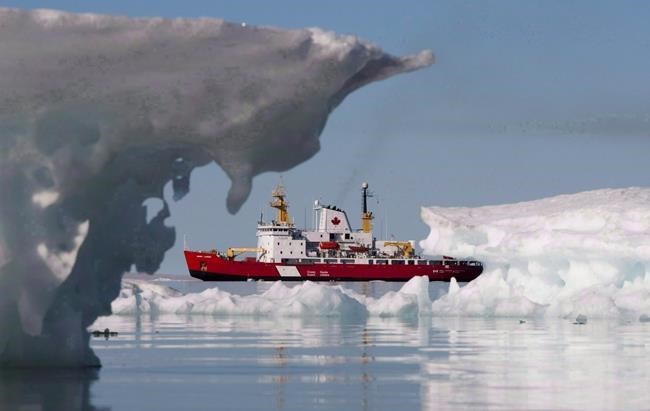More than a decade of delay and inaction has left the ships, planes and satellites that monitor Canada's rapidly opening Arctic on track to be retired before they can be replaced, the auditor general says.
"The federal government has not taken the required action to address long-standing gaps affecting its surveillance of Canada’s Arctic waters," says the report released Tuesday.
"The federal organizations that are responsible for safety and security in the Arctic region do not have a full awareness of maritime activities in Arctic waters and are not ready to respond to increased surveillance requirements."
Auditor General Karen Hogan found that sea ice cover has shrunk by 40 per cent over the last 50 years, with a corresponding tripling in vessel traffic to more than 450 transits.
That has left Canada's Arctic open to threats including unauthorized entry, illegal fishing and marine pollution. As well, Canada's ability to respond to accidents, such as the grounding of a cruise ship in poorly charted waters, is limited.
"More traffic just means more possibilities and more risk," Hogan said.
The federal government first noted those challenges in 2011, Hogan wrote. Work plans and gap assessments followed periodically, but little action ensued.
As a result, Hogan found the planned service life of all six of the Canadian Coast Guard's icebreakers will expire before new ones can be delivered. The lifespan of those vessels has had to be extended through retrofits and upgrades to keep them operating.
Even so, two of them, the Louis St-Laurent and the Terry Fox, will be permanently docked just as the new icebreakers are expected to enter service.
"(That leaves) little room for further delay if a gap in icebreaking capacity is to be avoided," says the report.
Three second-hand commercial icebreakers have had to be purchased and refitted to ensure icebreaking continues.
The situation is similar with satellites and airplanes.
The RADARSAT satellites that peer from space have an expected service life that extends until 2026. The Canadian Space Agency says it won't be able to orbit a replacement for another decade and a system operated by National Defence won't be working until 2035.
The Aurora aircraft that patrol the skies have an expected life through 2030, but they won't be replaced until at least two years later.
The report notes that three of the eight naval patrol vessels intended for Royal Canadian Navy and the Canadian Coast Guard have been delivered — although that program is also behind schedule.
Meanwhile, an Arctic naval base built on the site of an old mine port on the north tip of Baffin Island is of little use. Hogan wrote that because of budget cuts to the design, the Nanisivik Naval Facility, to open 2025, will only be used four weeks a year.
"The … facility will not effectively support the vessels that operate in the Arctic," the report said.
Arctic security expert Rob Huebert of the University of Calgary praised the report for clearly laying out what others have thought for years.
"I'm seeing nothing I haven't suspected all along," he said. "Don't you have to shake your head and wonder 'are we going to see movement?'"
Huebert called the imminent lack of satellite capacity particularly damning.
"To hear that by 2026 RADARSAT is going to be coming to the end of its life and there's no plans in place for the replacement. … That's not front and centre in terms of government replacement?"
Transport Minister Omar Alghabra said the government has accepted the report's recommendations.
“We are committed to working with our partners to address long-standing gaps in Arctic maritime domain awareness, particularly the continuous tracking of vessels … and to improving information sharing to ensure our Arctic waters are safe and secure," he said in a statement.
Canada can no longer afford to shortchange its northern frontier, Hogan said.
"The ability to surveil the Arctic takes tools and tools are aging. As delays continue, a gap will materialize."
This report by The Canadian Press was first published Nov. 15, 2022.
— Follow Bob Weber on Twitter at @row1960
Bob Weber, The Canadian Press



